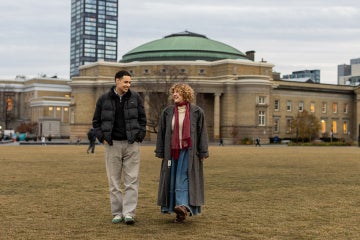Students from Ukraine take part in U of T's computer science summer research program

U of T researcher Brokoslaw Laschowski, left, speaks with Anton Zaliznyi and Bohdan Pikula at a recent event to welcome students from Ukraine who are participating in a computer science summer research program (photo by Polina Teif)
Published: May 19, 2023
Anastasiia Pedan has faced many challenges as an undergraduate student at the National Technical University of Ukraine – starting with the global pandemic, when her classes were moved online and she was unable to meet classmates in-person.
Then came the Russian invasion.
“There were alarms, bombings and death all around us,” says Pedan, who was in her second year, studying systems analysis. “It was really hard to concentrate on studying when you are literally living through historical events.”
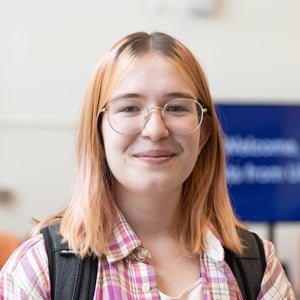
Today, Pedan is in Toronto to participate in the University of Toronto’s summer research program in computer science for students from Ukraine – one of 21 students selected from over 400 applicants this year.
The program – one of several initiatives at the university focused on supporting students from Ukraine – began in 2022 when Brokoslaw Laschowski, research scientist at the Toronto Rehabilitation Institute and an assistant professor in the Faculty of Applied Science & Engineering, and Michael Brudno, chief data scientist for the University Health Network and a professor of computer science in the Faculty of Arts & Science, asked their colleagues at universities in Ukraine what they could do to support students during the war.
“They suggested one of the best things we can do is provide a temporary safe haven for students to continue their research and education,” says Laschowski, who is also an affiliate faculty member at U of T’s Robotics Institute.
“That’s exactly what we started doing.”
With support from U of T’s department of computer science, the Vector Institute for Artificial Intelligence, the Robotics Institute and the department of mathematical and computational sciences at U of T Mississauga, the initiative gives Ukrainian computer science students the opportunity to work and study with top U of T faculty engaged in cutting-edge research. Each student is paired with a supervisor for four months and costs related to travel expenses, on-campus housing accommodations and a research stipend are fully covered.
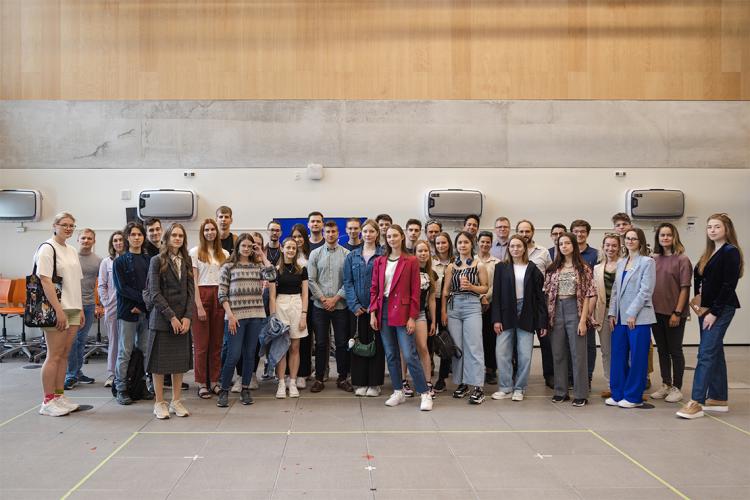
This week, organizers held a welcome event at Myhal Centre for Engineering Innovation & Entrepreneurship on the St. George campus to introduce incoming students to each other and to last year’s cohort. Brudno and Laschowski were there to greet their students, along with Melissa Judd, vice-president of research operations and academic partnerships at the Vector Institute, and Hallie Siegel, managing director of strategy and partnership at U of T’s Robotics Institute.
“This isn't charity. The mathematics and computer science programs in Ukraine have the potential to be world leading,” Laschowski told the crowd.
“The technical abilities and problem-solving skills of these students are incredible. By us investing in the future of Ukrainian education, we are in investing in the future of robotics and artificial intelligence.”
The welcome event brought together last year's cohort of students to meet the newcomers (photo by Polina Teif)
For her part, Pedan says she is looking forward to spending her summer conducting research about neural radiance fields with Igor Gilitschenski, an assistant professor in the department of mathematical and computational sciences at U of T Mississauga.
“It’s been an emotional roller coaster,” she says. “But it’s an honour to have been selected.”
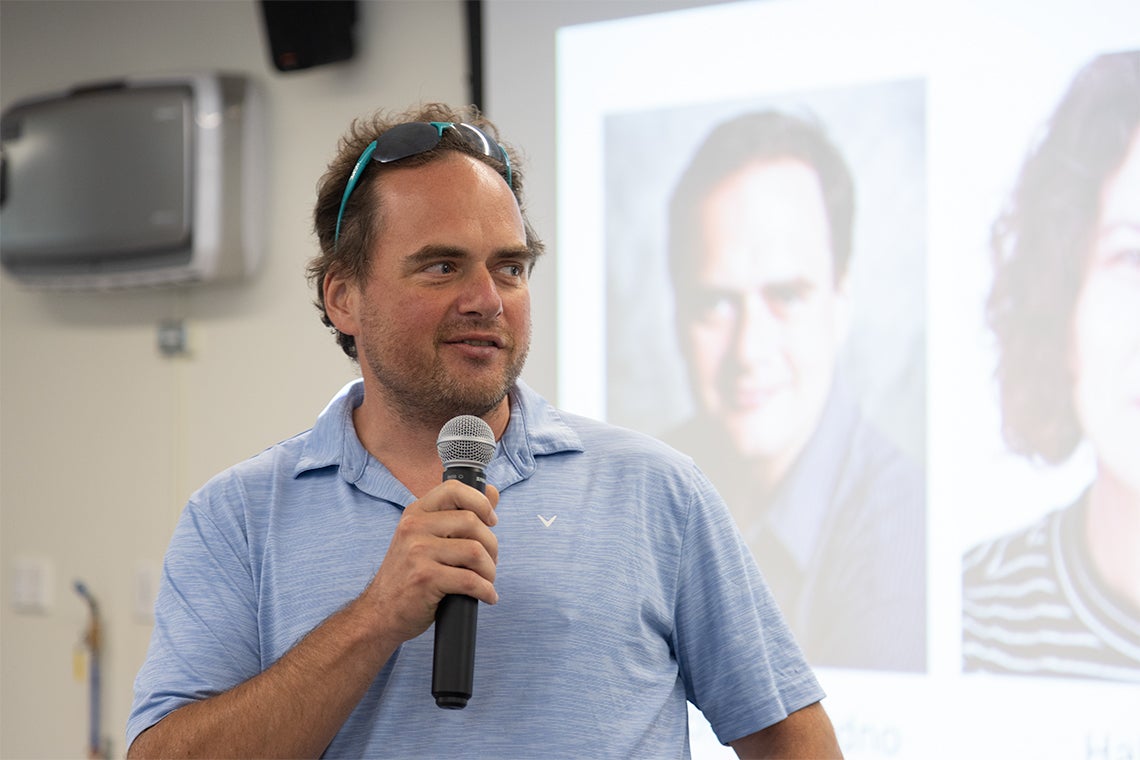
Anton Zaliznyi, meanwhile, will spend his summer researching surgical robots with Lueder Kahrs, an assistant professor at the Institute of Biomedical Engineering in the Faculty of Applied Science & Engineering and in the department of mathematical and computational sciences at U of T Mississauga.
“The end goal is to help create robots that can help surgeons operate,” Zaliznyi says. “We are a long way away from using it in real life, but I think it will be very impactful.”
In Ukraine, Zaliznyi managed to complete his undergraduate degree in software engineering and his first year of his master’s program in computer science despite the war. But everything had changed.
"You live day by day and it's really hard to think about the future," he says. "It was practically impossible to do any kind of research. I wasn't able to complete what I initially envisioned and planned for my thesis."
He says he is excited for the opportunity to engage with the research community at U of T.
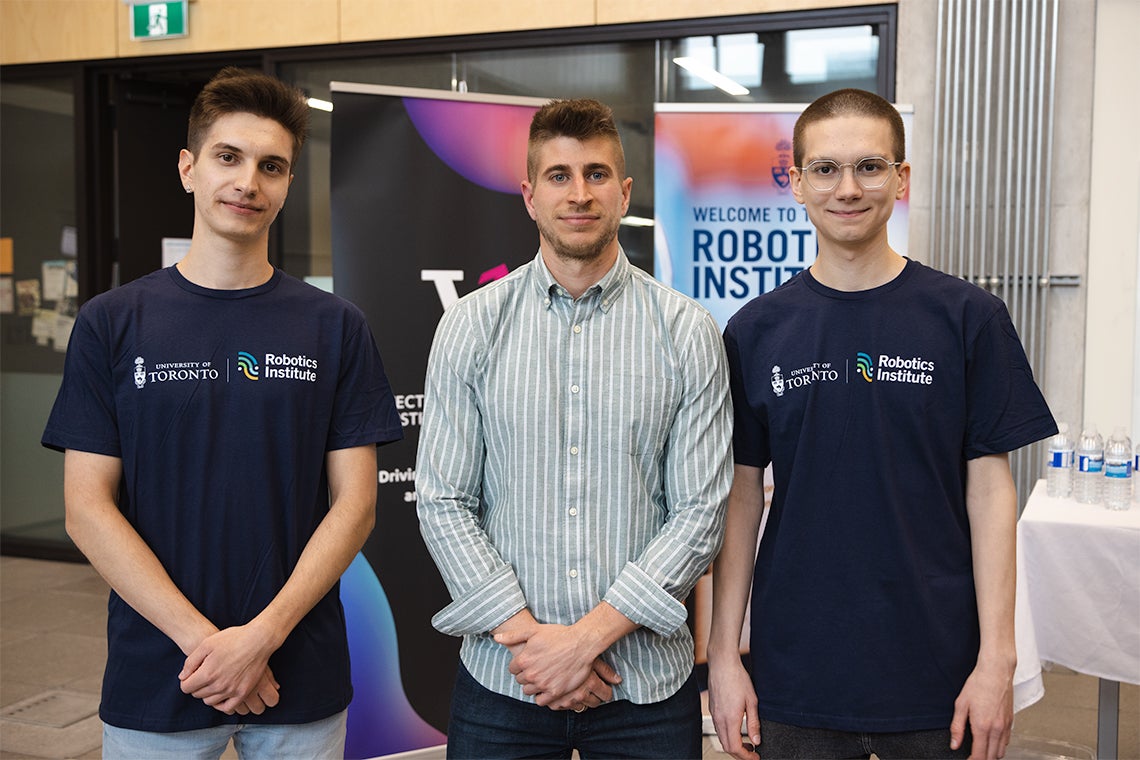
“University of Toronto is probably the best university in the world when it comes to research,” he says. “I honestly think that there are very few universities who can compete.”
At the welcome event, Roman Burakov and Oleksii Tsepa presented research they worked on last summer with Laschowski as their supervisor.
“I am very grateful for this opportunity,” says Burakov.
“We had our work accepted to the IEEE International Conference on Robotics and Automation (ICRA), which is the top tier robotics conference. Without this program, I would have never done that. It opens a lot of pathways for my future.”
As for Pedan, she has already met with her supervisor, visited the U of T Mississauga campus and Robarts Library on the St. George campus. She’s looking forward to seeing more of U of T and the city.
“As far as adjustments go, it’s been relatively quick,” she says.
“I’ve had to adjust to so many different situations and settings over the last two and a half years – so this is one is a walk in the park.”

